
9 tips to help your child eat better
Signs of poor eating habits
How do you tell whether your child does, in fact, have poor eating habits? There are many, but here are just five signs to watch out for in your child:
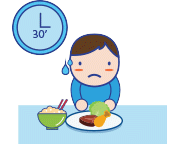
Your child takes longer than 30 minutes to complete his meals

Your child is underweight corresponding to his height and age
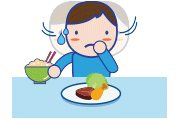
Your child avoids meals, covers his mouth, sometimes pretends to vomit and is generally fussy during meals
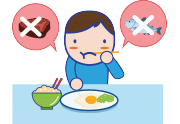
Your child is picky and chooses only to eat foods he is familiar with
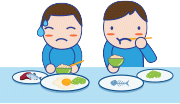
Your child has a reduced food intake compared to his peers
Causes of poor eating habits
It can be baffling when your child suddenly develops the avoidance of food, especially if he used to love mealtimes, but there could also be a variety of reasons why he has poor eating habits. Generally, it could be due to three main areas – namely food, the child himself or because of caregivers’ habits.
1.Food could be a cause of your child’s poor eating habits if foods given do not fit the child’s taste, or are not suitable for his stage of development.
Food

Food could be a cause of your child’s poor eating
habits if foods given do not fit the child’s taste, or
are not suitable for his stage of development
2.The child himself could be the reason for poor eating habits, so take note if your child displays these symptoms:
The Child Himself

Has disorders in the mouth
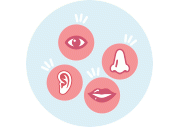
Has great sensitivity to particular smells and tastes
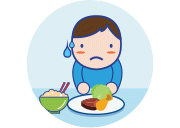
Has a poor appetite and refuses to eat, or eats a lot less than his regular intake

Has other physical or functional conditions
3.Caregivers can be another contributor to your child’s poor eating habits, and care should be taken if you recognise any of these indicators:
Caregivers
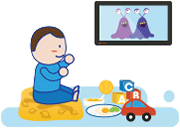
The caregiver places the child in an inappropriate environment for feeding (e.g. with distractions such as the TV or toys)
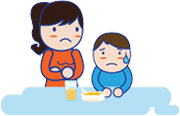
The caregiver’s approach to feeding is either too controlled or negligent (either extreme is bad)
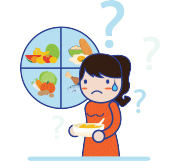
The caregiver has a lack of understanding of nutrition, and could be giving your child inappropriate food for his development
Solutions for poor eating habits
Depending on the cause of your child’s poor eating habits, there are various solutions that can be employed to improve them. Whatever the cause, the aim should be to break these habits and instead, form good eating habits that encourage your child to eat healthily for his proper growth and development.
Some children have lower food intake than usual, but it is appropriate for their nutritional needs
Parents’ misconceptions

Visit a paediatrician to get advice on children’s
growth and nutrition

Adopt the 9 tips for Moms
Your child enjoys playing and being active, but doesn’t show the same interest in food
Active children sometimes forgot to eat

Visit the doctor to ensure that the cause is not autism or attention deficit hyperactivity disorder

Adopt the 9 tips for Moms

Offer high calorie foods (1Kcal/1ml) to support your child’s growth
Illnesses and diseases, especially diabetes, can cause poor appetite
Illnesses

Seek timely treatment for your child

Provide nutritional support for your child as
directed by your doctor
Your child refusses certain foods because of their smell or shape
Pickiness

Show your child pictures of food to familiarise them with various foods

Let your child be involved in food preparation

Adopt the 9 tips for Moms

Consider nutritional supplements if there are certain foods your child will not take
9 tips for Moms
Dietary habits can persist through to adulthood if not managed, so it is crucial to find solutions to improve your child’s poor eating habits. These are nine tips that Moms can adopt to improve your child’s eating habits:

Have your child concentrate on eating without distractions (such as toys or the TV)
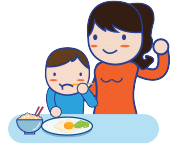
Offer your child age-appropriate food

Encourage your child when he eats well

Limit mealtimes to 30 minutes

Avoid forcing your child to eat, or openly showing your frustration

Patiently introduce food, starting with non-preferred items before favourites

Encourage your child to feed himself

Parents should be good role models for their child
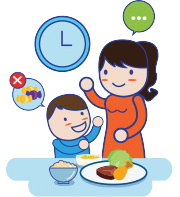
Avoid snacks between meals with an interval of at least three hours to improve your child’s appetite
Advanced reading: consequences of forced feeding
Care should always be taken in managing difficulties in feeding or poor eating habits as this could result in mild to severe stress on both the caregiver and the child, including a tensed relationship between mother and child.
More severe consequences include clear physical effects such as slow weight gain on the child and lowered immunity, as well as psychological effects such as frustration and anxiety during feeding time that leads to depression or additional disorders. Rather than trying to force-feed the child, the focus should be on adopting solutions to encourage the child to improve his eating habits.
Mild
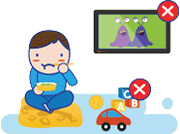
Have your child concentrate on eating without distractions (such as toys or the TV)
Severe

Physical effects
Slow weight gain, lack of nutrients, and
low immunity

Psychological effects
Frustration and anxiety during feeding time may
lead to mild depression or disorder
RELATED ARTICLES
